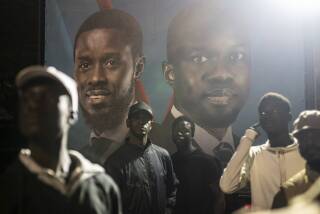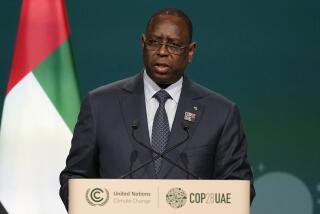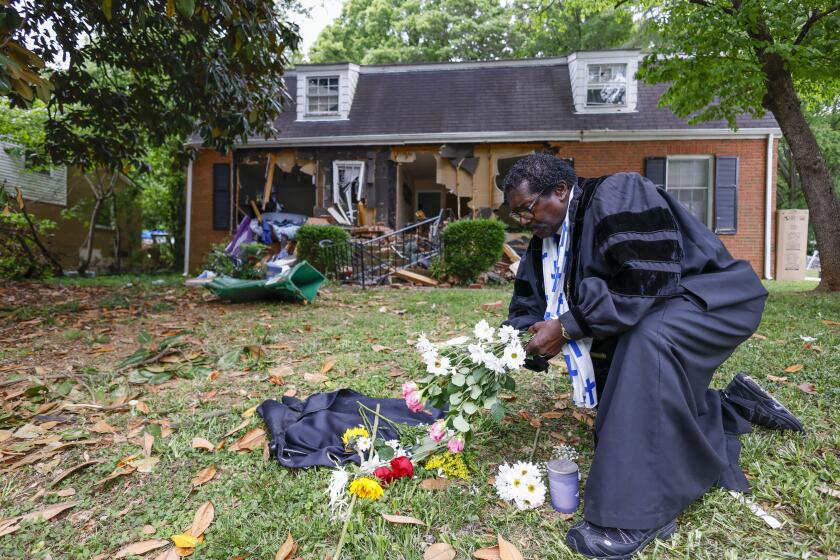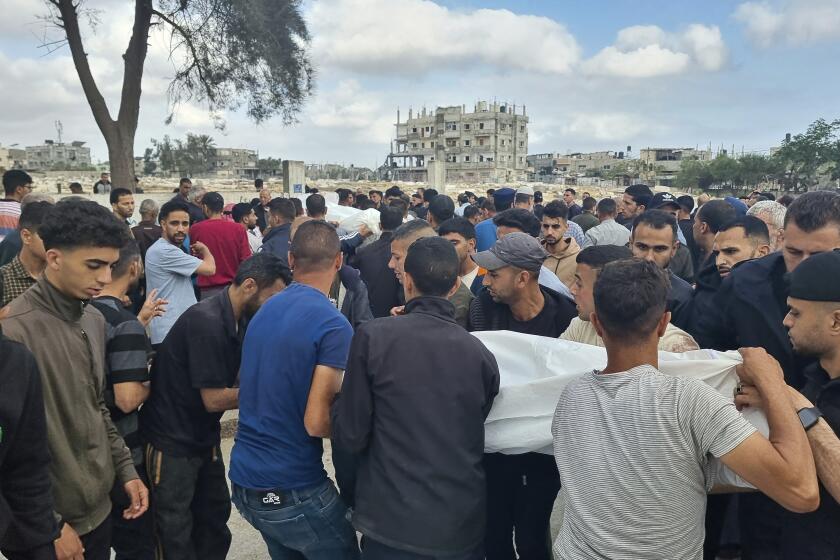Algerian protesters to longtime president: ‘Leave means leave’
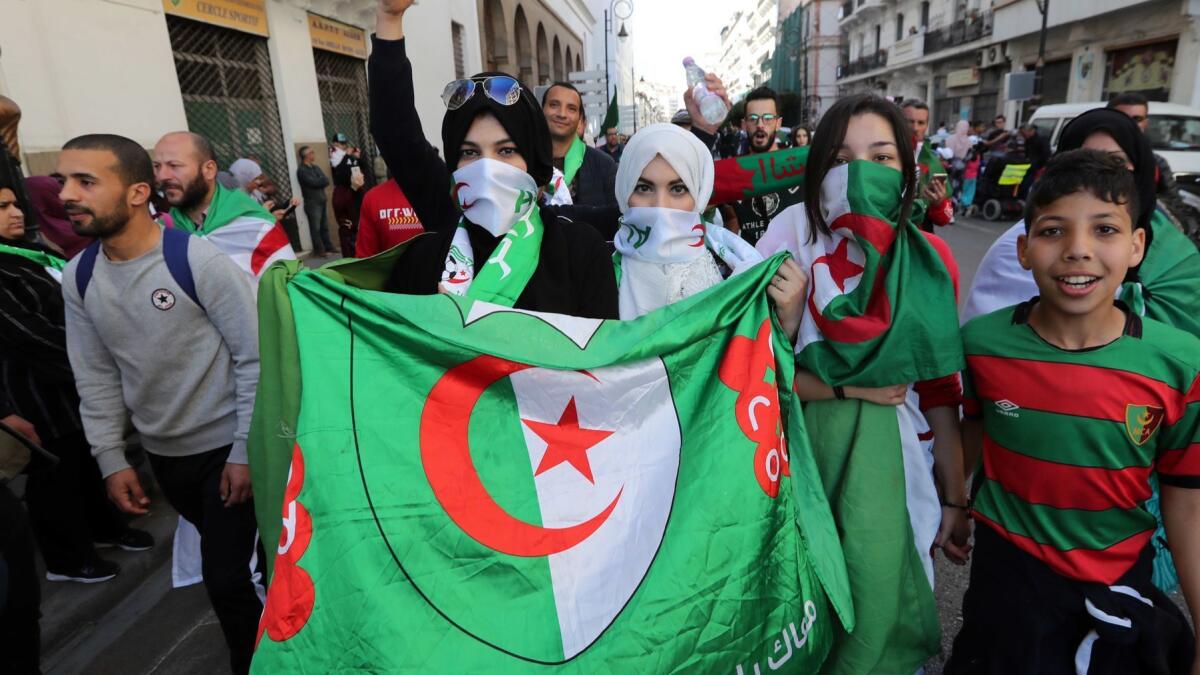
Days after Algeria’s ill 82-year-old president, Abdelaziz Bouteflika, announced under pressure that he would not seek a fifth term, protesters flooded the nation’s capital Friday to call for his government’s ouster.
With some wrapped in the country’s white-and-green flag and others holding banners with the terse message, “Leave means leave,” tens of thousands of people young and old marched peacefully a few hundred yards from the presidential palace in Algiers after Friday prayer services.
It was the fourth week of Friday protests against the longtime president, who had initially announced his intention to run again in the April 18 election, despite having suffered a stroke in 2013 that rendered him all but mute and unable to walk.
The move had enraged Algerians fed up with the barely-there Bouteflika, who recently returned from treatment in a Geneva hospital.
At first, Bouteflika tried to mollify the protesters, offering to serve only one more year if reelected. Then he seemed to relent, releasing a statement saying, “There will be no fifth term.”
The catch, however, was that the upcoming election would be postponed and the government reshuffled. A caretaker government, headed by former Interior Minister Noureddine Bedoui, would preside over the creation of the Inclusive and Independent National Conference, a body representative of “all Algerians.”
According to the plan, the leaders would craft a constitution by the end of 2019 and submit it to a referendum. If ratified, a date would be fixed for a presidential election in which Bouteflika promised he would not run.
The message from the people Friday, however, appeared to be a dismissal not only of Bouteflika, but also of “Le Pouvoir” (The Power), Algerians’ blanket term for the nexus of figures in the military, intelligence, government and business sectors who preside over the resource-rich North African country.
As the masses gathered, large numbers of riot police moved to block them from reaching the government palace. The mood, according to most reports, seemed peaceful, even festive.
Tout Sur L’Algerie, a news agency in Algeria known as TSA, showed images of an Algiers resident offering dates from a plastic box.
After Bouteflika’s announcement that he would not run again, the once-deft politician was unable to rally support for his alternative governing plans.
Even members of his own party, the National Liberation Front (FLN), began to distance themselves from him.
Speaking to Algerian television outlet Ennahar on Thursday, Hocine Kheldoun, a former FLN spokesman, said the president was “history now.” He added that the party had to support the protesters.
Bouteflika’s proposal, many said, was illegal.
“He’s staying as head of the country without any provision or possibility to know exactly when the election will take place …. He didn’t have the right to take that decision,” said Madjid Messaoudene, a French Algerian politician from the city of Tizi Ouzou, in a phone interview Thursday.
He then quickly added that the “decision,” which had been attributed to Bouteflika, was probably the work of his brother and his inner circle.
“What we’re sure of is that Algerian people are not demonstrating against a man, but against a regime,” he said, “the same regime that has been managing Algeria since 1962.”
Bouteflika and others around him have tried to tamp down protests by stoking fears of instability, harking back to years of internal strife in the 1990s, before his ascension.
But half the country’s population of 42 million is under the age of 27, according to estimates, and has no memory of the period often referred to as the “Black Decade.”
Most now are concerned about a lack of jobs, inadequate government services and political corruption — even though the country is rich enough in natural resources to supply a third of Europe’s gas needs.
In the run-up to the eighth anniversary of the Arab Spring, the series of revolutions that blasted through the region’s ossified autocracies, most governments believed they had reached a detente, however tense, with their restive citizenry.
In Egypt, where largely peaceful protesters forced the ouster of longtime President Hosni Mubarak, the country is again under the rule of an autocrat, Abdel Fattah Sisi. Syrian President Bashar Assad, with Russia and Iran backing him, has largely subdued his adversaries. Libya may remain a chaotic thicket of competing governments, but Persian Gulf nations appear secure in their rule.
Yet the masses on the streets of Algeria have leaders across the region paying attention.
Egypt’s Sisi, speaking Sunday, delivered an oblique criticism of the protests in Algeria.
“All this talk [of protests] comes at a price that people are required to pay,” he said in a televised address. “How are tourism or factories or trade supposed to get off the ground? Should we eat or should we say that we were busy protesting?”
The protests, now and eight years ago, were also in the thoughts of veteran Algerian diplomat Lakhdar Brahimi, 85, appointed by the government to head the transitional council.
In an interview with Algerian state news on Wednesday, Brahimi asserted that the “regime could not be dissolved overnight,” saying that such a move would plunge the country into the chaos of Iraq post-Saddam Hussein, deposed in the U.S.-led invasion in 2003.
Brahimi also cautioned against “haste” in adopting the new constitution and holding elections, saying that the result would end up like Egypt.
Yet his message resonated little with protesters, many of whom had already dismissed him for his remarks in a December magazine interview in which he said Algeria was “doing quite well” and that he did not believe Bouteflika’s rule was widely contested.
“No one will trust anyone from the same political circle as Bouteflika,” said Messaoudene, the French Algerian politician. All the government was doing, he said, was putting one minister in the place of another.
“It’s musical chairs. At the end, it’s the same game. We don’t want to play anymore,” he said. “They make the rules. That’s the problem. And we have to make our own rules now.”
More to Read
Start your day right
Sign up for Essential California for news, features and recommendations from the L.A. Times and beyond in your inbox six days a week.
You may occasionally receive promotional content from the Los Angeles Times.

